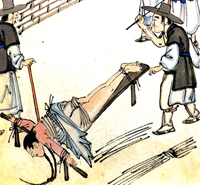 Korea has been very interested in punishment since the serial murder incident and child sex crimes were committed by Kang Ho-sun and Cho Du-sun respectively. There are many controversies about the execution of the death penalty and strengthening the punishment.
Korea has been very interested in punishment since the serial murder incident and child sex crimes were committed by Kang Ho-sun and Cho Du-sun respectively. There are many controversies about the execution of the death penalty and strengthening the punishment. These arguments are based on what is the purpose of the death penalty: punishment or guidance. During the period of the Three States, the punishment had the purpose of retribution for the criminals’ sins. Therefore, the system and method of the punishment were not organized well, and those were very severe. After the Goryeo Dynasty, the penal code was established for the first time. Accordingly, the intensity of the punishment became less severe than in the past. Therefore, it was hard to implement cruel penalties like being burnt at the stake on amputating limbs. There were no big differences in criminal law between the Goryeo Dynasty and the Joseon Dynasty. However, what we have to notice is there was a system to protect criminals’ rights established by the Gabo Reform in 1894.
In fact, Korea is regarded by Amnesty International as a country where capital punishment has been abolished since 2007. The reason was that Korea has not implemented capital punishment since the 23 criminals were hung on December 30 in 1997. At present, there are about 60 condemned criminals who are waiting for execution. There are about 20 criminals under the death penalty who have been waiting for execution for more than 10 years.
Present Korean criminal law considers the punishment as not only retribution for crime, but also education for enlightenment. Also, the punishments are based on the rights of man. For this, there are welfare services and suspended sentences.


 All
All






 이수진
이수진













